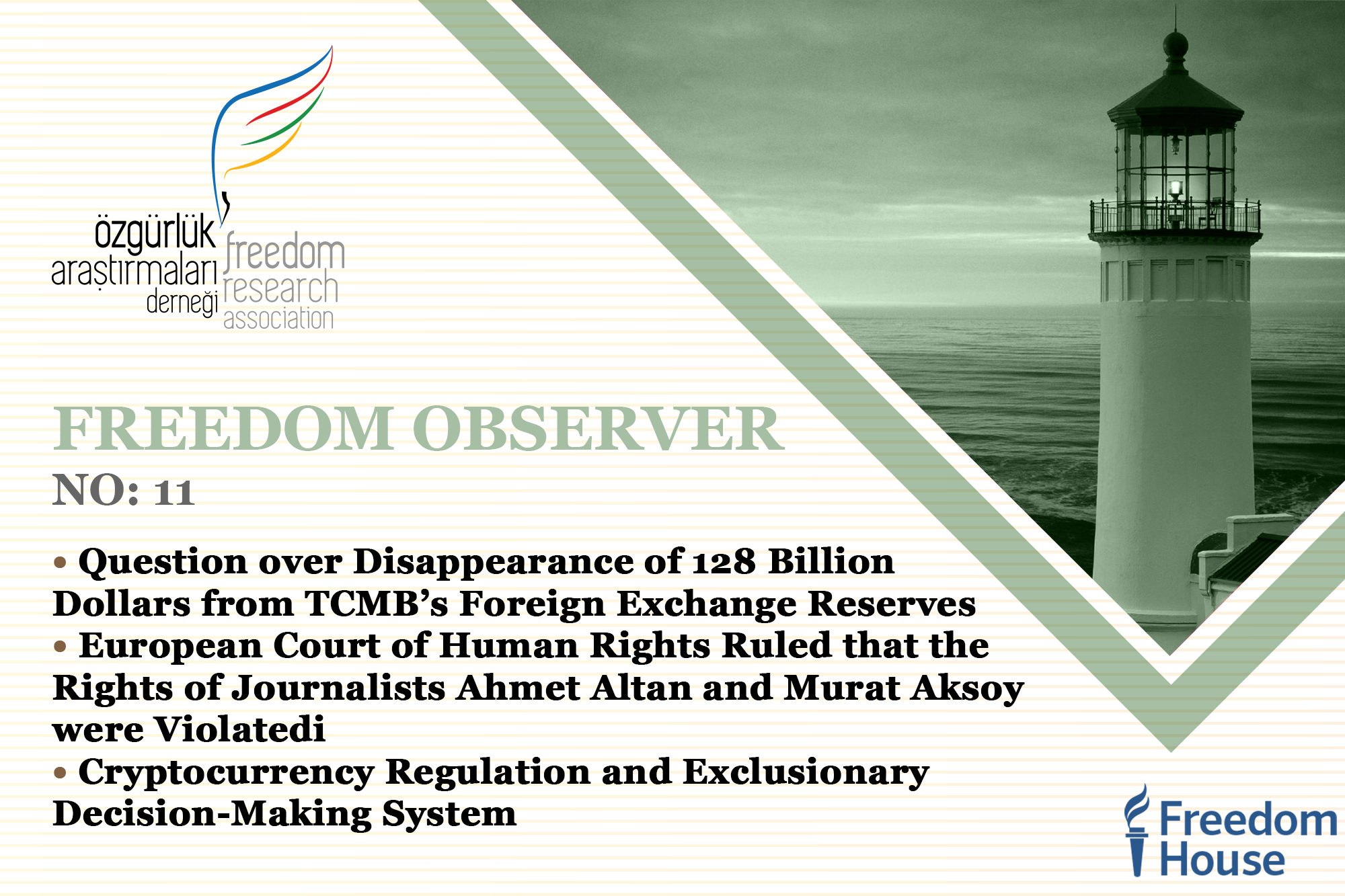“The state’s efforts to regulate an area that it is impossible to control by the state is the result of the desire to use force on the citizens and to be the sole decision-making authority in all matters.”
The eleventh issue of the “Freedom Observer” is now available on social media!
https://mailchi.mp/ozgurlukarastirmalari.com/freedom-observer-11
Question over Disappearance of 128 Billion Dollars from TCMB’s Foreign Exchange Reserves
In his speech at the group meeting in the parliament, Kemal Kilicdaroglu, the leader of CHP, has launched a political campaign over the issue of strange disappearance of a serious amount of money, worthy of 128 billion dollars, from TCMB’s FX reserves.[1]The central claim of the campaign is that foreign exchange reserves were sold with privileged sales outside of market prices, which had a great impact on the public opinion. Other opposition parties have begun to question the fate of 128 billion dollars and invited the government to make a credible statement. In this regard, IYI Party asked whether there is a political directive in the TCMB’s decision to sell foreign currency reserves.[2] DEVA Party chairman, Ali Babacan, stated that the TCMB’s reserves were dissolved in violation of the free exchange rate regime that constitutes a serious rule violation.[3] Opposition parties also claim that feared by the mounting political campaign, the government sent a couple of summaries of proceedings to the parliament last week to intimidate the opposition.[4]
The debate over the strange disappearance of foreign exchange reserves first started in November 2020, following the resignation of Treasury and Finance Minister Berat Albayrak. Later, the Reuters news agency claimed that Naci Ağbal, who was the President of the Central Bank at the time Mr. Albayrak resigned, was dismissed in March 2021 on account of initiating an investigation into foreign exchange sales, which had caused a loss of approximately $ 130 billion in reserves as of 2019.[5] The government, however, has not yet been able to give a satisfactory answer to the questions about the fate of 128 billion dollars, which came back to the agenda with the campaign launched by the CHP. Against the questions posed by Mr. Kilicdaroglu, the President Erdogan responded harshly and claimed “you cannot even ask me questions. Those leading the country must give an account to the people!”[6] Later, the President stated that the government “sometimes spent it during the pandemic and sometimes kept it in the Treasury”.[7] The TCMB’s President Kavcıoğlu stated that “it is not possible to bring such an odd claim over the loss of asset from the TCMB’s reserves since that the information and data of the Central Bank are shared with the public in an extremely transparent manner within international standards.[8]
These responses, however, are far away from satisfying the opposition parties and the public, and the government has been, simultaneously, trying to disrupt the campaign by deploying the police force. In cities such as Istanbul, Izmir, Rize, Niğde, the posters and banners in CHP’s facilities asking the government “Where is 128 Billion Dollars” were removed by the police at night.[9]
In democracies, it is modus operandi of the political system that opposition parties question the government over where and for what purposes the material resources are used. In recent years, dismissals and appointments made with political motivations have severely damaged the independence of the Central Bank and caused it to become an institution whose data is approached with suspicion. In this respect, lack of detailed and convincing answer from the government or the Central Bank regarding the strange disappearance of 128 billion dollars supports the idea that there is, at least, a certain kernel of truth in the opposition’s claims.
European Court of Human Rights Ruled that the Rights of Journalists Ahmet Altan and Murat Aksoy were Violated
In recent months, the European Court of Human Rights (ECHR) has been ruling on rights-violations for journalists arrested after the failed coup attempt in July 2016. The court, which first decided rights-violations on the applications of Cumhuriyet newspaper writers[10] and Ahmet Şık in November[11], then decided on Atilla Taş’s application in January[12] and finally the applications of Ahmet Hüsrev Altan[13] and Murat Aksoy[14] on April 13, 2021. The common feature of these applications is that the applicants were arrested on the charge of being allegedly associated with FETO terrorist organization after the failed coup attempt in July 2016 and detained for a long time. Some of these applicants were released several times and arrested again. All of them were put on a trial by the local courts and sentenced to various sentences, and their executions were completed. Although all of the applicants applied to the Constitutional Court, it was only in the application of Murat Aksoy that the Constitutional Court decided that there was no evidence to justify the arrest of the applicant.[15] However, the ECHR stated that there were no reasonable suspicion to justify the applicants’ arrest in all of these applications and that all the evidence cited as the reason for their detention were newspaper articles and shared messages within the framework of journalistic activities. The ECHR also made explicit that these are the activities carried out within the principle of freedom of expression protected under Article No. 10 of the Convention. In this regard, the ECHR ruled that the detention decisions by local courts lacked legal basis and violated the right to liberty and security of the applicants. In addition, the Court found that the applicants’ freedom of expression was also violated.
The ECHR’s decisions proved the fact that the judicial body in Turkey, from criminal courts of peace to the Court of Cassation and the Constitutional Court, failed to make a distinction, in conformity with the ECHR’s case-law, between legitimate journalistic activities and criminal activities. At the same time, such a failure reveals that the legislations and regulations on terrorism were interpreted and implemented in an unpredictably broad manner, and that legitimate criticisms were subjected to heavy accusations such as “aiding terrorist organizations” or even “membership” or “attempting to change the constitutional order”.
However, the ECHR, both in the previous decisions and in the last two decisions, either did not examine the allegations that these arrests had a political purpose or that Article No. 18 of the Convention, which prohibits the limitation of fundamental rights for purposes that are not prescribed in the Convention, was not violated. While in the Murat Aksoy decision, the Court did not consider it necessary to examine the applicant’s complaint over the Article No. 18 separately, it decided in the case of Ahmet Altan that the arrest was not made for political purposes. However, in both cases, the applicants were arrested soon after their release as a result of the campaigns carried out in the pro-government media. Ahmet Altan was released on the condition of judicial control after he was detained for the first time in 2016, but his arrest, this time, was ordered after his statements. Again in 2019, the Court of Cassation overturned the decision of the first instance court and ordered Mr. Altan’s release; yet he was arrested again a week later. ECHR judge Mr. Kuris, who voted against in Ahmet Altan verdict, stated that the Court should no longer ignore the fact that everyone is aware of. The judge Kuris quoted the following lines from Bob Dylan’s song “Blowin ‘in the Wind” from the 1963 album The Freewheelin: “Yes, and how many times can a man turn his head; And pretend that he just doesn’t see?” and reminded that this problem is also valid for institutions and even for national and international courts.
Cryptocurrency Regulation and Exclusionary Decision-Making System
On the Friday night, April 16, 2021, the regulation titled “The Regulation Prohibiting Payments with Crypto-Assets” was published in the Official Gazette by the Central Bank of the Republic of Turkey regarding crypto assets.[16] Although the regulation was very short and not comprehensive, it was found quite harsh for players in the cryptocurrency market. As it can be understood from the title, the main purpose of the statute is to prohibit the use of cryptocurrencies to receive and give payments in any trading transaction. In addition, producing services for this purpose was also prohibited. Moreover, sending to or withdrawing money from cryptocurrency exchanges through payment and electronic money institutions were also prohibited. [17]
This regulation contains a number of problems both in terms of the existing reality and the functioning of democratic mechanisms. First of all, it is necessary to define the regulation on crypto assets as just a prohibition activity rather than a regulation. Currently, the word “regulation” usually brings prohibition to minds in Turkey. Unfortunately, politics in Turkey does not work as a collective decision-making mechanism most of the time. Normally, while making important arrangements like this, all stakeholders need to be consulted, analysis and reports should be done. Trying to define an area that has never been regulated before with a prohibitive regulation issued by an institution at midnight is one of the most important signs that the current government is breaking away from reality. Because millions of people trade, get and provide loans everyday with cryptocurrencies in the world. The political mechanism should not only work to use of force; unrealistic, impracticable, uncontrollable things should not be imposed on people by the force of law. However, the state’s efforts to regulate an area that it is impossible to control by the state is the result of the desire to use force on the citizens and to be the sole decision-making authority in all matters.
The main problem of the regulation is that it sends a very negative signal to the market, as economic management in Turkey always does. This is such a damaging economic signaling that it not only weakens democratic institutions, but also tells people and institutions who will invest both knowledge and capital in the future that their gains could be lost because of a regulation issued overnight without consulting them in anyway. No one, domestic or foreign, wants to invest in such an unpredictable country. The constantly changing rules and the appetite to regulate every area -related or not- have reached such a point that these two corrupt situations have become feeding each other in Turkey. As institutions collapse, they cling to regulations that try to obstruct the market mechanism and make it dependent on the state, so the market shrinks, and the economic outlook deteriorates. As the economic situation worsens, the state mechanism clings to more regulation in order to fully retain resources. What will overcome this vicious cycle is not the improvement of the economic outlook. There is no indication that the economic outlook will improve in the short or medium term, anyways. For this reason, the current government must quickly deregulate many areas and pull itself out of the resource allocation mechanism as much as possible.
Devletin Alkol Polikalarini İzleme Platformu’nu temsilen Özgürlük Araştirmalari
Genel Sekreteri İsrafil Özkan bugün saat 15.00’de “Bugün Ne Oldu?”da
@Nevsinmengu
@Zknisrafil
[1]https://www.duvarenglish.com/main-opposition-chp-posters-probed-for-asking-about-128-bln-dollar-loss-in-turkish-central-banks-fx-reserves-news-57034
[2] https://www.gazeteduvar.com.tr/iyi-partiden-128-milyar-dolar-icin-15-soru-haber-1519538
[3]https://www.gazeteduvar.com.tr/128-milyar-dolar-tartismasi-nasil-basladi-rezervler-ne-durumda-galeri-1519262?p=2
[4] https://www.dw.com/tr/fezlekelerin-arkas%C4%B1nda-128-milyar-dolar-m%C4%B1-var/a-57219298
[5] https://www.reuters.com/article/us-turkey-cenbank-idUSKBN2BN1I1
[6] https://www.reuters.com/world/middle-east/show-us-money-erdogan-pressed-over-128-billion-used-support-lira-2021-04-14/
[7] https://www.dw.com/tr/fezlekelerin-arkas%C4%B1nda-128-milyar-dolar-m%C4%B1-var/a-57219298
[8] https://www.paturkey.com/news/central-bank-governor-explanation-on-128-billion-dollar-fx-reserve-meltdown-yet-the-question-remains/2021/
[9]https://m.bianet.org/english/politics/242495-police-remove-chp-banners-asking-where-is-128-billion-dollars
[10] Sabuncu and Others v. Turkey, no. 23199/17, 10.11.2020, http://hudoc.echr.coe.int/eng?i=001-206212
[11] Şik v. Turkey (No. 2), no. 36493/17, 24.11. 2020, http://hudoc.echr.coe.int/eng?i=001-206411
[12] Atilla Taş v. Turkey, no. 72/17, 19.01.2021, http://hudoc.echr.coe.int/eng?i=001-207680
[13] Ahmet Hüsrev Altan v. Turkey, no. 13252/17, 13.04.2021, http://hudoc.echr.coe.int/eng?i=001-209444
[14] Murat Aksoy v. Turkey, no. 80/17, 13.04.2021, http://hudoc.echr.coe.int/eng?i=001-209483
[15] Murat Aksoy [GK], B. No: 2016/30112, 2/5/2019, https://kararlarbilgibankasi.anayasa.gov.tr/BB/2016/30112?BasvuruAdi=Murat+Aksoy
[16] https://www.resmigazete.gov.tr/eskiler/2021/04/20210416-4.htm
[17] https://www.tcmb.gov.tr/wps/wcm/connect/EN/TCMB+EN/Main+Menu/Core+Functions/Payment+Service/





